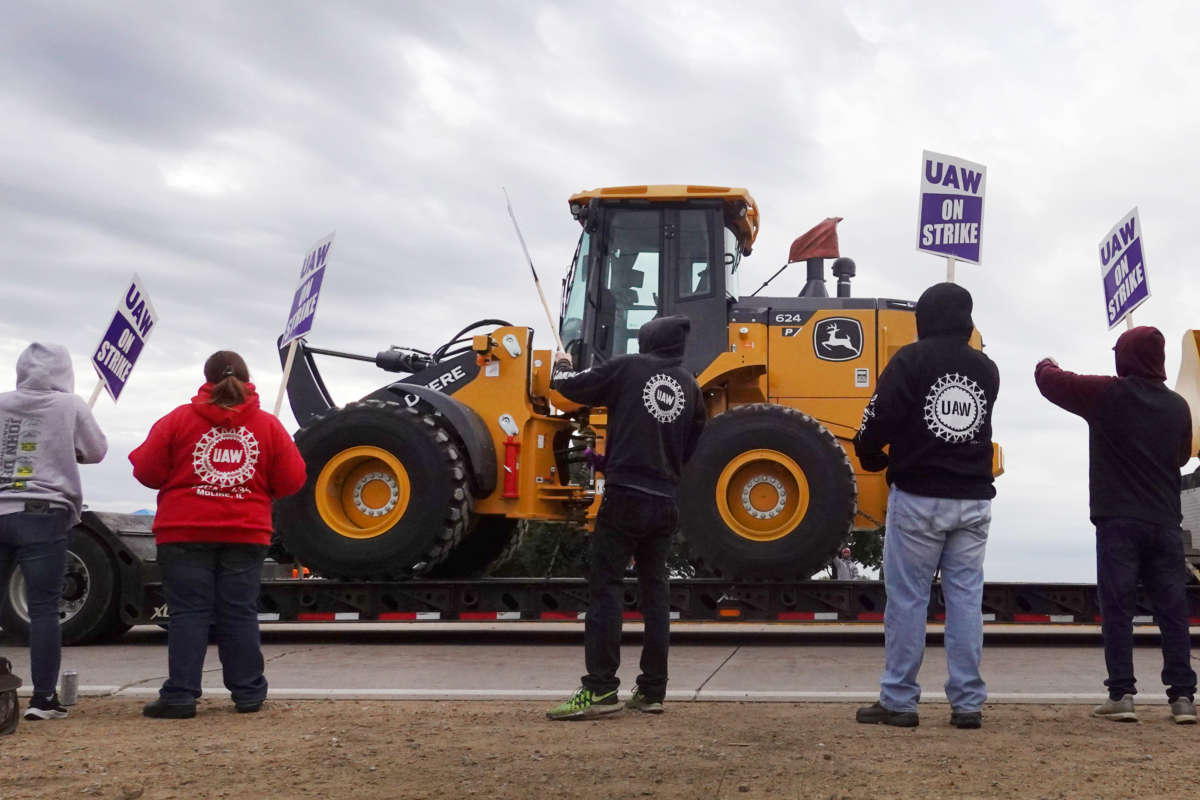Honest, paywall-free news is rare. Please support our boldly independent journalism with a donation of any size.
Union workers for equipment manufacturer John Deere voted to approve a new contract on Wednesday, ending a strike sustained by over 10,000 workers at 14 locations for nearly five weeks.
The new agreement lasts six years, and includes a 10 percent wage increase, 5 percent raises in 2023 and 2025 and the preservation of a previous pension program that the company had originally planned on cutting for people hired after a certain date. The contract also includes a $8,500 signing bonus.
The contract was ratified with 61 percent of members voting in favor and 39 percent voting against. The strike was the largest in the country amid a wave of strikes and labor movements. One union member died during the strike after being struck and killed by a vehicle as he was walking to the picket line.
United Auto Workers (UAW) has described the agreement as “groundbreaking” and standard-setting.
“The sacrifice and solidarity displayed by our John Deere members combined with the determination of their negotiators made this accomplishment possible,” said Chuck Browning, UAW vice president. “They have started a movement for workers in this country by what was achieved here today and they have earned the admiration and respect of all that strive for what is just and equitable in the workplace.”
Union members had rejected previous contracts offering lower pay hikes and nixing pensions for new hires — provisions that one worker called “a slap in the face,” according to Labor Notes. The workers began striking in October after the company offered several inadequate contracts. Workers said that long hours, along with increased demand, had created difficult working conditions. Meanwhile, the company was reporting record earnings.
John Deere had attempted to break the strike by cutting off health care benefits for workers at the end of October. That decision was panned by labor advocates and Sen. Bernie Sanders (I-Vermont), who called the move “beyond outrageous.”
The company claimed last week that it had “economically exhausted” its offers, which some workers questioned. “Look at what they’re paying executives,” welder Chuck Smith told the Des Moines Register. “Look at what they’re giving their CEO. It’s corporate greed.”
Other workers expressed relief over the new agreement. “I’m exhausted and nervous, but I’m proud of what was accomplished,” Illinois John Deere worker Kristin Jordan told The Washington Post.
The new contract comes as thousands of workers across the country are either preparing for a strike or actively striking. About 40,000 Kaiser Permanente workers are striking beginning on Thursday, in solidarity with roughly 600 engineers who say they are not paid as much as workers in similar positions in the Northern California region. The company had reached an agreement with 32,000 employees who were set to strike over a tiered pay system that would pay employees hired after 2023 lower wages.
University of Pittsburgh Medical Center workers are also striking on Thursday; Boston Museum of Fine Arts workers went on strike on Wednesday; and bus drivers in Minneapolis are saying that they’re prepared to strike over low pay and safety concerns. Meanwhile, Kellogg’s workers are on the seventh week of their strike, and the company has filed a lawsuit against the union claiming that strikers are blocking the entrance to the plant.
Trump is silencing political dissent. We appeal for your support.
Progressive nonprofits are the latest target caught in Trump’s crosshairs. With the aim of eliminating political opposition, Trump and his sycophants are working to curb government funding, constrain private foundations, and even cut tax-exempt status from organizations he dislikes.
We’re concerned, because Truthout is not immune to such bad-faith attacks.
We can only resist Trump’s attacks by cultivating a strong base of support. The right-wing mediasphere is funded comfortably by billionaire owners and venture capitalist philanthropists. At Truthout, we have you.
Truthout has launched a fundraiser to raise $41,000 in the next 7 days. Please take a meaningful action in the fight against authoritarianism: make a one-time or monthly donation to Truthout. If you have the means, please dig deep.
